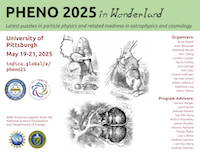Speaker
Description
We study the applicability of the usual finite temperature effective potential in the equation of motion of a homogeneous "misaligned" scalar condensate , and find important caveats that severely restrict its domain of validity: i:) the assumption of local thermodynamic equilibrium (LTE) is in general not warranted, ii:) a direct relation between the effective potential and the thermodynamic entropy density entails that the entropy becomes a non-monotonic function of time, iii:) parametric instabilities in both cases with and without spontaneous symmetry breaking lead to profuse particle production with non-thermal distribution functions, iv:) in the case of spontaneous symmetry breaking spinodal instabilities yield a complex effective potential, internal energy and entropy, an untenable situation in thermodynamics. All these caveats associated with dynamical aspects, cannot be overcome by finite temperature equilibrium resummation schemes. We argue that the dynamics of the condensate leads to decoupling and freeze-out from (LTE), and propose a closed quantum system approach based on unitary time evolution. It yields the correct equations of motion without the caveats of the effective potential, and provides a fully renormalized and thermodynamically consistent framework to study the dynamics of the "misaligned" condensate, with real and conserved energy and entropy amenable to numerical study.

